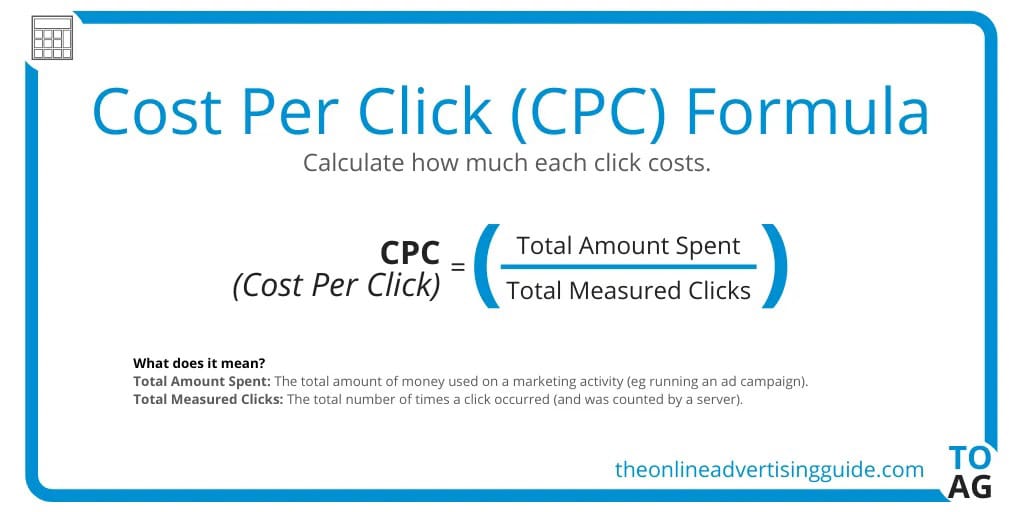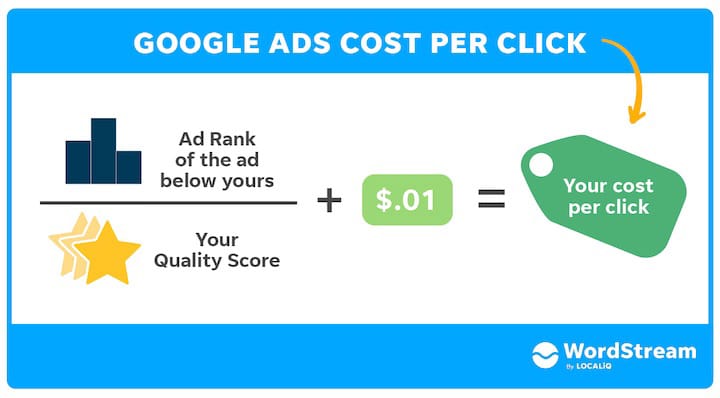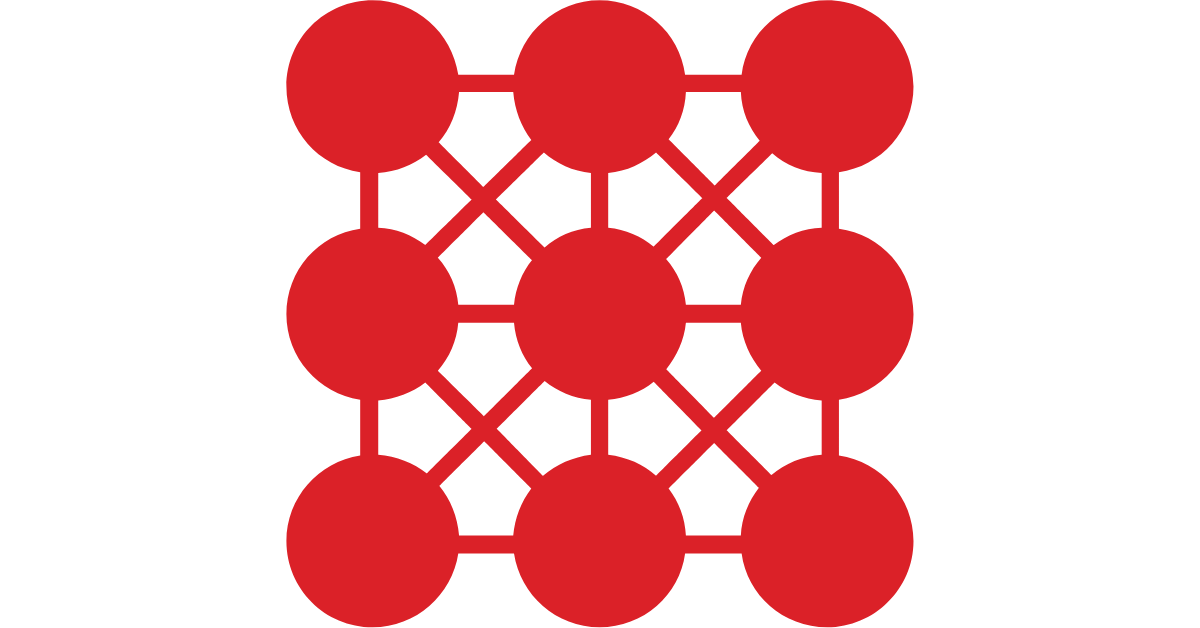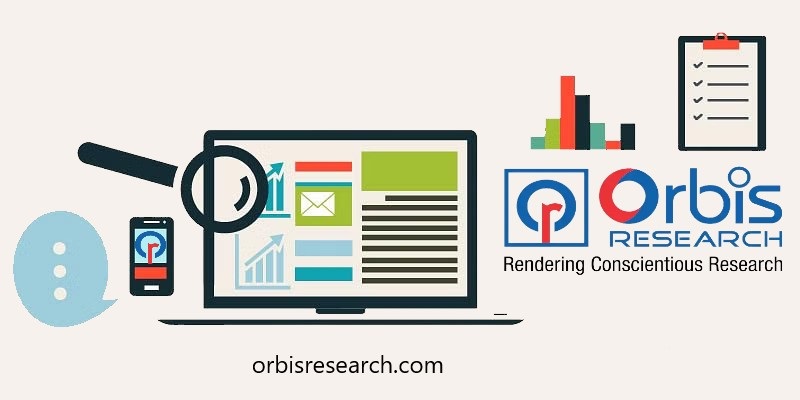
Capturing your audience’s attention is not easy in today’s digital age. Endless online advertisements and the popularity of social media platforms make it difficult to stand out from the crowd. This is where Cost Per Click (CPC) comes in. This game-changing strategy allows businesses to create meaningful connections that turn clicks into tangible growth. Let’s take a look at CPC, what it is, and how it might just be the secret weapon you need to boost marketing efforts and start seeing business growth.
The dynamic world of digital marketing is yours to explore. You’ve probably heard of “Cost Per Click” or CPC if you’re researching internet advertising strategies. But what does it mean, and how can businesses make good use of it?
Cost Per Click (CPC)
CPC is the metric used with the Pay-Per-Click (PPC) model. Pay-per-click is one type of search engine advertising where brands pay-per-click on the ads they publish. CPC, cost per click, is a metric used to measure how much an advertiser pays each time someone clicks on their ad. Cost per click is an important marketing metric because it shows you your return on investment (ROI) for ad campaigns. Return on investment helps us, as marketers, gauge the effects of a campaign, whether good or bad. This knowledge then influences how you allocate the budget and plan future campaigns. Without CPC, we would have no way to monitor the success of our campaigns and continue to improve our strategies.
Unfolding the Mystery of Pay-per-Click Advertising
With CPC campaigns, advertisers only pay when an actual interaction results from the advertisement rather than for the advertisement’s simple presence or “impression” (CPM or Cost Per Mille). CPC can be compared to a virtual handshake between a company and a potential customer. Every click has the potential to generate a lead, a sale, or a new connection.
This process uses a bidding system. Brands and advertising teams will bid on specific keywords related to their services or products. When those keywords are searched on Google your ad will appear on the results page. At this point, the advertiser has not paid for the ad. The amount you pay per click will depend on various elements such as bid amount, quality score, and competition. To make the most out of PPC, you need to complete the full process. This includes optimizing landing pages, writing compelling ads, and using the right keywords.
The Importance of CPC as a Marketing Metric
Here are some reasons why CPC is an essential metric for digital marketers:
- Budget Control: Advertisers set the maximum amount they’re willing to pay per click, allowing for better budget management. Monitoring the cost per click will let you know if you’re staying within the budget and if you are allocating the funds appropriately for the ad campaign.
- Performance Tracking: CPC, combined with other metrics like conversion rate, allows marketers to gauge the effectiveness of their campaigns.
- Targeting: PPC campaigns often allow for detailed targeting, ensuring the ads reach the desired audience. Targeted ads can also help generate leads and CPC helps you pinpoint the effectiveness of your plan.
- High ROI Potential: Since you pay only for genuine interactions if optimized well, these campaigns can offer a high return on investment. The cost per click will allow you to keep track of your ROI.

How to Use PPC Effectively
Using PPC effectively isn’t just about setting a budget and watching the clicks roll in. Here’s a step-by-step guide to making the most of your ad campaigns:
- Define Your Goals: Before diving into any advertising campaign, identify what you want to achieve. Whether it’s brand awareness, product sales, or lead generation, your goal will shape your strategy.
- Research Keywords: If you’re using platforms like Google Ads, keyword research is crucial. Use tools to find keywords relevant to your business but also consider their competition and cost.
- Set A Realistic Budget: Decide the maximum amount you’re willing to pay per click, considering your overall campaign budget and the expected conversion rate.
- Craft Compelling Ads: A click-worthy ad is clear, relevant, and enticing. The copy should resonate with your target audience, and any visuals should be high-quality and engaging.
- Monitor and Optimize: Regularly analyze your campaign’s performance. Are you getting the desired clicks? Are those clicks leading to conversions? Adjust your keywords, ad copy, or target audience as needed.
- A/B Testing: Try different versions of your ad to see which performs best. This continuous testing and refining will ensure that your ads are always optimized.
- Landing Page Relevance: Once a user clicks on your ad, where do they land? Ensure your landing pages are relevant to the ad copy and optimized for conversions.

Steps to Lower CPC to Make The Most of Your Campaign and Budget
Improve Quality Score
Your quality score is used to compare your ads to other advertisements. It measures keywords on a scale from 1-10 using relevance, expected CTR, and the landing page as a guide. Ad relevance looks at how your ad matches user search intent. CTR is the click-through rate and indicates the number of users that click on the ad. The expected CTR is what the search engine predicts is the likelihood of users clicking on your ad. Finally, as part of the Quality Score, it takes into account the landing page experience and how relevant the landing page is for users who click.
Bid on Long-Tail Keywords
Long-tail keywords are very specific search queries. They tend to have a lower monthly search volume which makes it easier to rank for the term while also costing less than keywords with high monthly search volumes. Bidding on long-tail keywords can make a significant impact on your campaign results and budget.
Effectively Use Negative Keywords
Using negative keywords effectively can help reduce the cost per click. It excludes certain keywords from your search campaigns to narrow down the audience that sees your ads as well as prevent you from using your marketing budget on irrelevant terms.
Ad Scheduling
Ad scheduling plays a big role in CPC. Scheduling your ad for peak days and times will put your ad in front of your target audience. It is also important to adjust your bid during different times of the day based on user activity.
Geo-targeting
Geo-targeting is a way to narrow your audience and again, put your ad in front of users who may be interested in your products and services. Target specific countries, regions within a country, a specific location, or a radius around a location. Adjust bids for various search locations to make the most of your ad.
Use Different Keyword Match Types
Keyword match explains how closely a specific keyword aligns with a search query to trigger the ad. There are three keyword match types; broad match, phrase match, and exact match. Each match type has different goals. Use the match types to support your ad objectives to optimize your PPC campaign.
The Challenges of PPC Advertising
While pay-per-click ads are a powerful marketing tool, it’s not without challenges:
- Bidding Wars: Popular keywords can be expensive. Small businesses might find it challenging to compete with larger enterprises. That is why using long-tail keywords and using addition strategies can make such a big difference.
- Click Fraud: Some malicious entities click on ads to inflate costs. Although platforms like Google have mechanisms to detect and prevent this, it remains a concern.
- Conversion Misalignment: Remember, a click doesn’t always equate to a sale. Ensuring that those clicks lead to conversions is crucial. Use your ads as part of a digital marketing strategy rather than focusing on them alone. You don’t want to put all your eggs in one basket.
Final Thoughts
In the ever-evolving landscape of digital marketing, CPC stands out as a precise and accurate metric. It’s not just about clicks—it’s about creating meaningful interactions that propel your business forward. Every click is a dialogue, a potential customer, and a testament to the power of targeted advertising. If leveraged correctly, PPC can be the catalyst that transforms your online presence, moving you forward to see ad campaign success.
Cost Per Click advertising offers businesses a specific and effective way to reach potential customers. By understanding its ins and outs, setting clear goals, and continuously optimizing, you can harness the power of CPC for impressive growth.
Looking for expert assistance with your PPC Campaigns? Fusion One Marketing has a dedicated team ready to help you navigate and conquer the digital advertising realm. Reach out to us today!
https://fusiononemarketing.com/cost-per-click/




